New mouse models can help researchers study MCT8 deficiency - an inherited genetic disorder in children, says study. MCT8 deficiency is a serious diagnosis.

MCT8 deficiency (MCT8-specific Thyroid Hormone Cell Transporter Deficiency) is a rare genetic condition that affects mostly males. Children with MCT8 deficiencies often experience severe developmental delays, poor head control, low muscle tone, and unclear or no speech. MCT8 deficiency is caused by a mutation in the MCT8 (Monocarboxylate transporter 8) gene. In mice, Mct8 deficiency results in an impaired transport of T3, but not of T4 into the brain, and it is not associated with any neurological impairments.
To learn more about MCT8 deficiency, a team of researchers led by Steffen Mayerl, a PhD candidate in the lab of Heike Heuer, PhD, at the Leibniz Institute for Age Research/Fritz Lipmann Institute, in Jena, Germany, thus speculated that in mice, TH uptake into the CNS is facilitated by Mct8 and by Oatp1c1, a T4-specific TH transporter localized at the blood-brain barrier. To define the role of Mct8 and Oatp1c1 in brain TH transport, they began by generating Mct8/Oatp1c1 double knockout (dko) mice and analyzing them by determining T4 transport, brain TH content, deiodinase activities, and expression levels of TH-regulated gene products in wild type, the respective single and double mutant animals. They performed immunohistochemical stainings to determine neuronal differentiation and myelination at different postnatal timepoints. The mice were also subjected to extensive behavioral studies.
They found that, in contrast to Mct8 ko and Oatp1c1 ko mice, Mct8/Oatp1c1 dko mice exhibited a strongly diminished uptake of T4 into the CNS. Hence, brain T4 and T3 content was pronouncedly reduced, while type 2 deiodinase activities were found to be highly elevated. Determination of T3-regulated gene products indicated a severe hypothyroid state of the brain in the absence of both transporters. As a consequence, differentiation of inhibitory neurons in the cerebral cortex, as well as myelination, was strongly impaired. Finally, behavior tests revealed coordination and locomotor deficits in Mct8/Oatp1c1 dko mice.
These data point to a critical function of Mct8 and Oatp1c1 in the transport of TH into the brain. Since Oatp1c1 is only weakly expressed in the human CNS, Mct8/Oatp1c1 dko mice may be considered as an animal model for human MCT8 deficiency.
Source-Newswise















